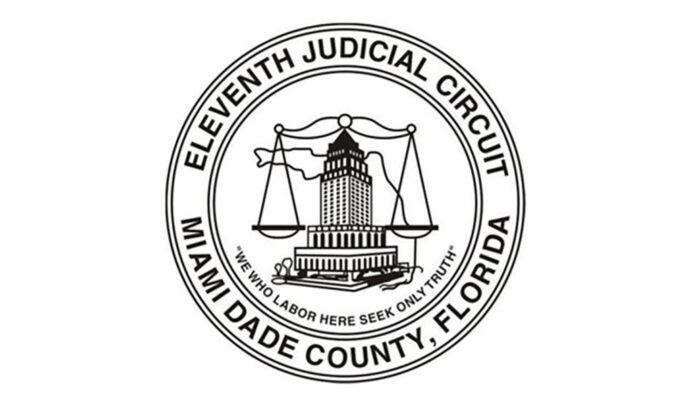|
Getting your Trinity Audio player ready...
|
The Miami-Dade Courts and its justice partners are collaborating on a pretrial justice improvement project. The aim is to increase public safety, address inequities in the current system, and give judges more information with which to make the best pretrial detention decisions under the law in criminal court cases.
The Advancing Pretrial Policy and Research (APPR) Project, now more than two years in the planning, was made possible through a competitive grant from the Arnold Foundation, now Arnold Ventures, and involves collaboration with the State Attorney’s Office, Public Defender’s Office, Miami-Dade Department of Corrections and Rehabilitation, Dade Chiefs of Police, Homeless Trust, and Thriving Mind South Florida.
A project launch date has not been set but is projected sometime during 2023. The project is still in the planning stages, but in order to provide accurate information and counter misinformation, the main components of the project, as well as the requirements of Florida law, are detailed below.
Highlights of Florida Law Regarding Pretrial Detention
- The Florida State Constitution provides that “every person charged with a crime or violation of municipal or county ordinance shall be entitled to pretrial release on reasonable conditions.” Judicial officers can only consider pretrial detention for two groups of people (Fla. Const. art. I, §14):
- those charged with a capital offense or an offense punishable by life imprisonment
- those for whom no conditions of release can reasonably protect the community from risk of physical harm to persons, assure the presence of the accused at trial, or assure the integrity of the judicial process.
- The Florida Legislature has stated it intends for the “primary consideration” regarding pretrial detention to “be the protection of the community from risk of physical harm to persons” (Fla. Stat. § 907.041(1))
Shortcomings of Existing Pretrial Processes
Money vs Community Safety:
Because financial conditions of release are so widely used, a person’s wealth has become the primary determinant of whether they will be released or detained before trial, instead of the likelihood they will flee or pose a threat to public safety – the only two outcomes that can legally be considered.
Existing pretrial justice procedures in Miami-Dade allow people who can afford to post monetary bond – or the 10% premium required by a bonding agent – to “bond out” of jail on any bondable offense, including violent offenses, even if they used a gun, and without ever seeing a first appearance judge.
Inequity and Inefficient Use of Taxpayer Money:
Persons charged with minor crimes and who pose little risk to community safety remain in jail if they do not have the means to post a monetary bond. This means that taxpayer money is wasted incarcerating those who pose little risk to the community, instead of those who do pose a threat to public safety.
What Is Not Changing
The proposed plan DOES NOT eliminate cash bail or first appearance hearings.
First appearance judges will still have the discretion to set a cash bond when appropriate under the law as applied to the individual facts of each case.
What Is Changing
No “Bond-Out” for Violent Charges, Career Criminals or Repeat Offenders:
The proposed plan DOES require all arrestees accused of violent offenses, including gun charges, to appear before a judge in a first appearance hearing before they can be released. This is a marked improvement over our current system, which allows many people in this category to bond out without seeing a judge – regardless of the charge, prior history, or whether there is a victim who should be heard. There are more than 700 offenses which will now require a first appearance hearing.
The same is true for those with extensive criminal histories, dubbed “career criminals.” Under the proposed plan, “career criminals” will be held until they can see a judge and will no longer be permitted to pay their way out of jail without a first appearance hearing.
Tools and Extensive Data for Judges:
The APPR plan provides judges and justice partners with tools and information, projecting the likelihood that an arrestee will return to court and will remain offense-free.
The tools include:
- A Public Safety Assessment (PSA) an actuarial tool that looks at the type of charge, the age of the individual, any past criminal history, and other metrics to project the likelihood that they will appear for future court dates and will not re-offend while out on pretrial release.
- A Release Conditions Matrix developed and customized for Miami-Dade County to help match a person’s scores on the PSA to pretrial release conditions. This works hand in hand with the PSA and all the decision trees that judges will use for release or detention determinations.
- An Excluded Offense List of more than 700 charges, including violent and gun-related charges, that will no longer be eligible for “bonding out” without seeing a judge. Persons charged with any of these must remain in jail until they can see a first appearance judge.
The project team’s goal is and has always been to utilize evidence-based tools in order to improve public safety and ensure future court appearances, while ensuring that no one is jailed simply because they are poor. Community safety – and not money – will be the primary determinants of pretrial release and detention decisions.
Anyone who would like to learn more or would like to be invited to future educational events on this project is invited to send questions to: feedback@jud11.flcourts.org.The project team members will be happy to provide accurate information and address any concerns.






